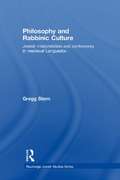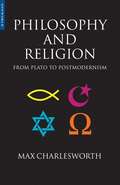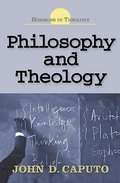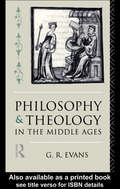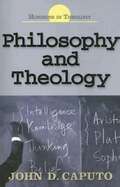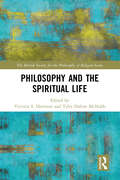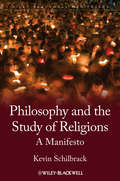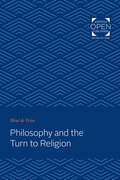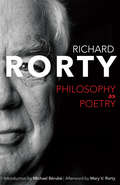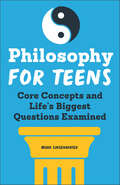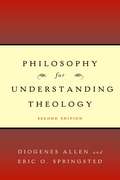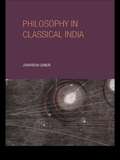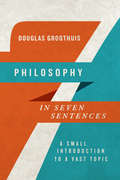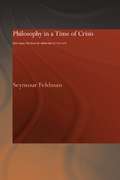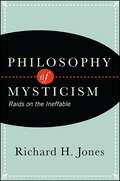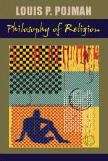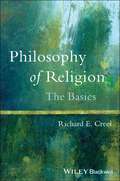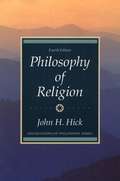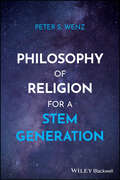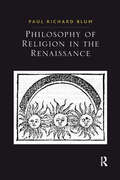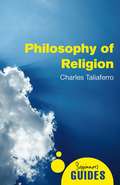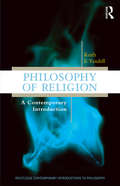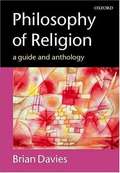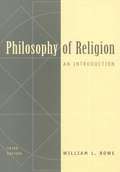- Table View
- List View
Philosophy and Rabbinic Culture: Jewish Interpretation and Controversy in Medieval Languedoc (Routledge Jewish Studies Series)
by Gregg SternPhilosophy and Rabbinic Culture is a study of the great, and curiously underappreciated, engagement of a Medieval European Jewish community with the philosophic tradition. This lucid description of the Languedocian Jewish community's multigenerational cultivation of - and acculturation to - scientific and philosophic teachings into Judaism fulfils a major desideratum in Jewish cultural history. In the first detailed account of this long-forgotten Jewish community and its cultural ideal, the author gives an expansive reappraisal of the role of the philosophic interpretation in rabbinic culture and medieval Judaism. Looking at how the cultural ideal of Languedocian Jewry continued to develop and flourish throughout the thirteenth and fourteenth centuries, with particular reference to the literary style and religious teaching of the great Talmudist, Menahem ha-Meiri, Stern explores issues such as Meiri’s theory of "civilized religions", including Christianity and Islam, controversy over philosophy and philosophic allegory in Languedoc and Catalonia, and the cultural significance of the medical use of astrological images. This book will be of great interest to scholars and students of Religion, of Judaism in particular, and of Philosophy, History and Medieval Europe, as well as those interested in Jewish-Christian relations.
Philosophy and Religion from Plato to Postmodernism: From Plato to Postmodernism
by Max CharlesworthFrom the works of the Greek philosophers to the Postmodernist theories of Jacques Derrida and Richard Rorty, this authoritative survey encompasses over two thousand years of interaction between philosophical and religious though.<P><P>Exploring the various ways in which philosophy can relate to the monotheistic religions, the author tracks five key approaches in a carefully structured and accessible manner. Following a chronological pattern, these five chapters consider both major and less well-known philosophers, and feature detailed coverage of:Plato, Aristotle and the Ancient GreeksPhilosophy and theology in St Augustine and Thomas Aquinasreason, agnosticism and the works of Kant and KierkegaardLinguistic Analysis, religion and WittgensteinPostmodernism and religion: Heidegger, Derrida and RortyAccompanied by full reference notes, this thorough and up to date text is essential reading for all students and thinkers who wish to know more about philosophy,religion and the diverse ways in which these two fields have come together over the centures.
Philosophy and Theology
by John D. CaputoA highly engaging essay that will draw students into a conversation about the vital relationship between philosophy and theology. John D. Caputo addresses the great and classical philosophical questions as they inextricably intersect with theology.
Philosophy and Theology in the Middle Ages
by G. R. EvansIn the ancient world being a philosopher was a practical alternative to being a christian. Philosophical systems offered intellectual, practical and moral codes for living. By the Middle Ages however philosophy was largely, though inconsistently, incorporated into Christian belef. From the end of the Roman Empire to the Reformation and Renaissance of the sixteenth century Christian theologians had a virtual monopoly on higher education. The complex interaction between theology and philosophy, which was the result of the efforts of Christian leaders and thinkers to assimilate the most sophisticated ideas of science and secular learning into their own system of thought, is the subject of this book. Augustine, as the most widely read author in the Middle Ages, is the starting point. Dr Evans then discusses the classical sources in general which the medieval scholar would have had access to when he wanted to study philosophy and its theological implications. Part I ends with an analysis of the problems of logic, language and rhetoric. In Part II the sequence of topics - God, cosmos, man follow the outline of the summa, or systematic encyclopedia of theology, which developed from the twelfth century as a text book framework. Does God exist? What is he like? What are human beings? Is there a purpose to their lives? These are the great questions of philosophy and religion and the issues to which the medieval theologian addressed himself. From `divine simplicity' to ethics and politics, this book is a lively introduction to the debates and ideas of the Middle Ages.
Philosophy and Theology: A Theology Of Difficult Glory (Horizons in Theology)
by John CaputoA highly engaging essay that will draw students into a conversation about the vital relationship between philosophy and theology.In this clear, concise, and brilliantly engaging essay, renowned philosopher and theologian John D. Caputo addresses the great and classical philosophical questions as they inextricably intersect with theology--past, present, and future. Recognized as one of the leading philosophers, Caputo is peerless in introducing and initiating students into the vital relationship that philosophy and theology share together. He writes, “If you take a long enough look, beyond the debates that divide philosophy and theology, over the walls that they have built to keep each other out or beyond the wars to subordinate one to the other, you find a common sense of awe, a common gasp of surprise or astonishment, like looking out at the endless sprawl of stars across the evening sky or upon the waves of a midnight sea.”
Philosophy and the Spiritual Life (The British Society for the Philosophy of Religion Series)
by Victoria S. Harrison Tyler Dalton McNabbThis book breaks new ground for the philosophy of religion by showcasing work that engages with the lived reality of the spiritual life. It demonstrates that philosophy’s relationship with spirituality is more than a historical curiosity and that, in the twenty-first century, it is still meaningful to think about philosophy in connection with spirituality. The chapters are organised around the following themes: spiritual practice and philosophical understanding; philosophical reflections on living a spiritual life; philosophical problems concerning the spiritual life. The first part discusses whether or not the topic of spirituality should be given a more fundamental role within the philosophy of religion, and, if so, how that might be accomplished. The second part addresses fundamental issues concerning human beings, their lives, and their self-understanding in relation to the spiritual life. The final part considers philosophical problems that emerge when discussing the spiritual life. By bringing together discussions of these topics, this volume constitutes a valuable resource for scholars in disciplines in which the spiritual life is a focus of interest, particularly philosophy, theology, and religious studies.
Philosophy and the Study of Religions: A Manifesto (Wiley-Blackwell Manifestos)
by Kevin SchilbrackPhilosophy and the Study of Religions: A Manifesto advocates a radical transformation of the discipline from its current, narrow focus on questions of God, to a fully global form of critical reflection on religions in all their variety and dimensions. Opens the discipline of philosophy of religion to the religious diversity that characterizes the world today Builds bridges between philosophy of religion and the other interpretative and explanatory approaches in the field of religious studies Provides a manifesto for a global approach to the subject that is a practice-centred rather than a belief-centred activity Gives attention to reflexive critical studies of 'religion' as socially constructed and historically located
Philosophy and the Turn to Religion
by Hent de VriesOriginally published in 1999. If religion once seemed to have played out its role in the intellectual and political history of Western secular modernity, it has now returned with a vengeance. In Philosophy and the Turn to Religion, Hent de Vries argues that a turn to religion discernible in recent philosophy anticipates and accompanies this development in the contemporary world. Though the book reaches back to Immanuel Kant, Martin Heidegger, and earlier, it takes its inspiration from the tradition of French phenomenology, notably Emmanuel Levinas, Jean-Luc Marion, and, especially, Jacques Derrida. Tracing how Derrida probes the discourse on religion, its metaphysical presuppositions, and its transformations, de Vries shows how this author consistently foregrounds the unexpected alliances between a radical interrogation of the history of Western philosophy and the religious inheritance from which that philosophy has increasingly sought to set itself apart.De Vries goes beyond formal analogies between the textual practices of deconstruction and so-called negative theology to address the necessity for a philosophical thinking that situates itself at once close to and at the farthest remove from traditional manifestations of the religious and the theological. This paradox is captured in the phrase adieu (à dieu), borrowed from Levinas, which signals at once a turn toward and a leave-taking from God—and which also gestures toward and departs from the other of this divine other, the possibility of radical evil. Only by confronting such uncanny and difficult figures, de Vries claims, can one begin to think and act upon the ethical and political imperatives of our day.
Philosophy as Poetry (Page-Barbour Lectures)
by Richard Rorty Michael Bérubé Mary Varney RortyUndeniably iconoclastic, and doggedly practical where others were abstract, the late Richard Rorty was described by some as a philosopher with no philosophy. Rorty was skeptical of systems claiming to have answers, seeing scientific and aesthetic schools as vocabularies rather than as indispensable paths to truth. But his work displays a profound awareness of philosophical tradition and an urgent concern for how we create a society. As Michael Bérubé writes in his introduction to this new volume, Rorty looked upon philosophy as "a creative enterprise of dreaming up new and more humane ways to live." Drawn from Rorty's acclaimed 2004 Page-Barbour lectures, Philosophy as Poetry distills many of the central ideas in his work. Rorty begins by addressing poetry and philosophy, which are often seen as contradictory pursuits. He offers a view of philosophy as a poem, beginning with the ancient Greeks and rewritten by succeeding generations of philosophers seeking to improve it. He goes on to examine analytic philosophy and the rejection by some philosophers, notably Wittgenstein, of the notion of philosophical problems that have solutions. The book concludes with an invigorating suspension of intellectual borders as Rorty focuses on the romantic tradition and relates it to philosophic thought.This book makes an ideal starting place for anyone looking for an introduction to Rorty's thought and his contribution to our sense of an American pragmatism, as well as an understanding of his influence and the controversy that attended his work.Page-Barbour Lectures
Philosophy for Teens: Core Concepts and Life's Biggest Questions Examined
by Mark LinsenmayerExplore philosophy through thought-provoking questions for teens If you like to ask deep questions about the world around you, then you already think like a philosopher. This book presents philosophy through fascinating questions you may have already thought about, like: Can we prove the existence of a God? What are minds, really? How can we be sure about anything? Ponder all these ideas and many more as you learn core philosophy concepts and strengthen your critical thinking skills.What sets this book about philosophy for kids ages 12 to 16 apart:An introduction to philosophy—Discover the history of philosophy, what makes a question philosophical in nature, and how being a philosopher can benefit you.The six main branches—Find questions organized by their branch of philosophy: metaphysics, epistemology, ethics, logic, aesthetics, and political philosophy.Philosophy in practice—Learn which philosophers asked and answered each question, explore different sides of an argument, and apply philosophical concepts to real life.Ponder life's biggest questions with this teen-friendly choice in philosophy books.
Philosophy for Understanding Theology, Second Edition
by Diogenes Allen Eric O. SpringstedThis new edition of Philosophy for Understanding Theology adds chapters on postmodernism and questions of the self and the good to bring the book up to date with current scholarship. It introduces students to the influence that key philosophers and philosophical movement through the centuries have had on shaping Christian theology in both its understandings and forms of expression
Philosophy in Classical India: An Introduction and Analysis
by Jonardon GaneriThis original work focuses on the rational principles of Indian philosophical theory, rather than the mysticism more usually associated with it. Ganeri explores the philosophical projects of a number of major Indian philosophers and looks into the methods of rational inquiry deployed within these projects. In so doing, he illuminates a network of mutual reference, criticism, influence and response, in which reason is used to call itself into question. This fresh perspective on classical Indian thought unravels new philosophical paradigms, and points towards new applications for the concept of reason.
Philosophy in Seven Sentences: A Small Introduction to a Vast Topic (Introductions in Seven Sentences)
by Douglas GroothuisSocrates—The unexamined life is not worth living.Augustine—You have made us for yourself, and our hearts are restless until they rest in you.Descartes—I think, therefore I am.Pascal—The heart has reasons, that reason knows nothing of.
Philosophy in a Time of Crisis: Don Isaac Abravanel: Defender of the Faith (Routledge Jewish Studies Series)
by Seymour FeldmanThe expulsion from Spain did not only result in the destruction and dispersion of Spanish Jewry but led to a crisis in Jewish faith. Don Isaac Abravanel provided a systematic treatment of the main philosophical and theological beliefs of Judaism in an attempt to resolve the inner doubts of his co-religionists. In their Italian exile his son Judah too recognized that Jews were now living in a new cultural world, but he forged a different road for Jews to pursue in their entry into the culture of the Renaissance. This book presents a picture of one family facing the challenges of a new era in Jewish history.
Philosophy of Mysticism: Raids on the Ineffable
by Richard H. JonesThis work is a comprehensive study of the philosophical issues raised by mysticism. Mystics claim to experience reality in a way not available in normal life, a claim which makes this phenomenon interesting from a philosophical perspective. Richard H. Jones's inquiry focuses on the skeleton of beliefs and values of mysticism: knowledge claims made about the nature of reality and of human beings; value claims about what is significant and what is ethical; and mystical goals and ways of life. Jones engages language, epistemology, metaphysics, science, and the philosophy of mind. Methodological issues in the study of mysticism are also addressed. Examples of mystical experience are drawn chiefly from Buddhism and Advaita Vedanta, but also from Christianity, Judaism, Islam, and Daoism.
Philosophy of Religion
by John CottinghamReligious belief is not just about abstract intellectual argument; it also impinges on all aspects of human life. John Cottingham's Philosophy of Religion opens up fresh perspectives on the philosophy of religion, arguing that the detached neutrality of much of contemporary philosophizing may be counterproductive - hardening us against the receptivity required for certain kinds of important evidence to become salient. This book covers all the traditional areas of the subject, including the meaning of religious claims, the existence of God and the relation between religion and morality, as well as the role of spiritual praxis and how religious belief affects questions about the meaning of life, human suffering and mortality. While preserving the clarity and rigor that are rightly prized in the analytic tradition, the book also draws on insights from literary and other sources, and aims to engage a wide readership.
Philosophy of Religion
by Louis J. PojmanThe author's goal in writing this book in philosophy of religion is to produce a text which is analytically rigorous, accessible to students, and balanced in presentation and which covers the major issues, ranging from the traditional arguments for and against the existence of God through personal identity and immortality to the questions of the relationship between faith and reason and the relationship between morality and religion.
Philosophy of Religion
by Richard E. CreelPhilosophy of Religion: The Basics offers a concise introduction to philosophy of religion, distilling key discussions and concepts of the subject to their succinct essence, providing a truly accessible entry into the subject.A truly accessible introduction to philosophy of religion for beginnersTakes a topical approach, starting with the nature of religion and moving the reader through the major concepts, explaining how topics connect and point to one anotherOffers a thorough and full treatment of diverse conceptions of God, the ontological argument, and divine attributes and dilemmasA genuinely concise introduction, this text can be used alongside other resources without overtaxing studentsRepresents 30 years of experience teaching to undergraduatesIncludes a free downloadable file with key excerpts and additions to help students study
Philosophy of Religion (4th Edition)
by John H. HickRevision features an updated discussion on the main topics in the philosophy of religion: the concept of God - grounds for belief in God - ground for disbelief in God - the problem of evil - revelation and faith - problems of religious language - the conflicting falsifiability of religious assertions - the conflicting truth-claims of different religions - human destiny and more.
Philosophy of Religion for a STEM Generation
by Peter S. WenzA Fresh and Engaging Introduction to Philosophy of Religion for STEM Students Philosophy of Religion for a STEM Generation applies a new cross-disciplinary approach to the age-old questions of religion and science. Written by philosopher and educator Peter S. Wenz, this innovative textbook combines the rigor of scientific reasoning with the depth of theological inquiry, creating a unique bridge between STEM students and philosophy of religion. Using humor, pop culture, and personal narratives, Wenz considers philosophical questions surrounding the existence of God, the nature of the universe, free will, the problem of evil, and other key philosophical arguments. Fully integrating scientific theories and methods into discussions of traditional religious topics, the book not only considers the scientific worldview but also examines how science and theology can complement one another. Student-friendly chapters offer fascinating insights into how philosophical analysis and scientific evidence can converge while providing a balanced examination that makes complex ideas relatable and thought-provoking, without taking a stance on whether or not God actually exists. Philosophy of Religion for a STEM Generation is ideal for students in undergraduate Philosophy of Religion or Philosophy of Science courses, as well as all students seeking to understand religion’s role in a scientific world and explore life’s biggest questions at the intersection of science, faith, and philosophy.
Philosophy of Religion in the Renaissance
by Paul Richard BlumThe Philosophy of Religion is one result of the Early Modern Reformation movements, as competing theologies purported truth claims which were equal in strength and different in contents. Renaissance thought, from Humanism through philosophy of nature, contributed to the origin of the modern concepts of God. This book explores the continuity of philosophy of religion from late medieval thinkers through humanists to late Renaissance philosophers, explaining the growth of the tensions between the philosophical and theological views. Covering the work of Renaissance authors, including Lull, Salutati, Raimundus Sabundus, Plethon, Cusanus, Valla, Ficino, Pico, Bruno, Suárez, and Campanella, this book offers an important understanding of the current philosophy/religion and faith/reason debates and fills the gap between medieval and early modern philosophy and theology.
Philosophy of Religion: A Beginner's Guide (Beginner's Guides #3)
by Charles TaliaferroWhy does evil exist? Could God could create a stone he couldn't lift? Does the wonder of life imply a creator? Philosophy of religion is concerned with such questions. Assuming no prior knowledge of philosophy, Taliaferro provides a clear exploration of the discipline, covering the key topics of morality and religion, evil, the afterlife, prayer, and miracles. Also containing a section dedicated to Hinduism, Buddhism and the Eastern religions, this helpful primer is the perfect resource for students or the general reader. Charles Taliaferro is Professor of Philosophy at St. Olaf College, Minnesota, USA. He is the author or editor of numerous books on the philosophy of religion including as co-editor of The Blackwell Companion to Philosophy of Religion.
Philosophy of Religion: A Contemporary Introduction (Routledge Contemporary Introductions to Philosophy)
by Keith E. YandellKeith Yandell's Philosophy of Religion: A Contemporary Introduction was one of the first textbooks to explore the philosophy of religion with reference to religions other than Christianity.?This new, revised edition explores the logical validity and truth claims of several world religions—Christianity, Judaism, Islam, Hinduism, Buddhism, and Jainism—with updated, streamlined discussions on important topics in philosophy of religion such as: Religious pluralism Freedom and responsibility Evidentialist Moral Theism Reformed Epistemology Doxastic Practice Epistemology The problem of evil Ontological and cosmological arguments Other new features include updated Questions for Reflection,and new Annotated Bibliographies for each chapter, as well as an updated Glossary. This exciting new edition, much like its classic predecessor, is sure to be a classroom staple for undergraduate students studying philosophy of religion, as well as a comprehensive introductory read for anyone interested in the subject.
Philosophy of Religion: A Guide and Anthology
by Brian DaviesPhilosophy of Religion: A Guide and Anthology provides a comprehensive, authoritative, and accessible overview of the philosophy of religion. Under the careful editorship of Brian Davies, the book contains a selection of the best classical and contemporary writings on the philosophy of religion together with substantial commentary, introductory material, discussion questions, and detailed guides to further reading. The editorial material sets the extracts in context and guides the readerthrough them. Taken as a whole, the book offers the ideal, self-contained introduction to the questions which have most preoccupied Western philosophers when thinking about religion. The selection is both very comprehensive and very generous. 65 sizeable extracts map out the full range of topics most commonly encountered in courses on the philosophy of religion. Part I looks at the relation between philosophy and religious belief; Parts II-IV consider the existence and nature of God; Part Vaddresses the 'problem of evil'; and Parts VI and VII are devoted to the relationship between morality and religion and to the question of life after death.
Philosophy of Religion: An Introduction
by William L. RoweThird Edition: It is reasonably clear that the arguments for the existence of God will continue to receive serious attention.
